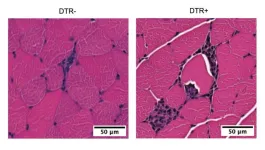(Press-News.org)
BOSTON – Ready or not, patients with cancer are increasingly likely to find themselves interacting with artificial intelligence technologies to schedule appointments, monitor their health, learn about their disease and its treatment, find support, and more. In a new paper in JCO Oncology Practice, bioethics researchers at Dana-Farber Cancer Institute call on medical societies, government leaders, clinicians, and researchers to work together to ensure AI-driven healthcare preserves patient autonomy and respects human dignity.
The authors note that while AI has immense potential for expanding access to cancer care and improving the ability to detect, diagnose, and treat cancer, medical professionals and technology developers need to act now to prevent the technology from depersonalizing patient care and eroding relationships between patients and caregivers. While previous papers on AI in medicine have focused on its implications for oncology clinicians and AI researchers, the new paper is one of the first to address concerns about AI embedded in technology used by patients with cancer.
"To date, there has been little formal consideration of the impact of patient interactions with AI programs that haven't been vetted by clinicians or regulatory organizations," says the paper's lead author, Amar Kelkar, MD, a Stem Cell Transplantation Physician at Dana-Farber Cancer Institute. "We wanted to explore the ethical challenges of patient-facing AI in cancer, with a particular concern for its potential implications for human dignity."
As oncology clinicians and researchers have begun to harness AI – to help diagnose cancer and track tumor growth, predict treatment outcomes, or find patterns of occurrence – direct interface between patients and the technology has so far been relatively limited. That is expected to change.
The authors focus on three areas in which patients are likely to engage with AI now or in the future. Telehealth, currently a platform for patient-to-clinician conversations, may use AI to shorten wait times and collect patient data before and after appointments. Remote monitoring of patients' health may be enhanced by AI systems that analyze information reported by patients themselves or collected by wearable devices. Health coaching can employ AI – including natural language models that mimic human interactions – to provide personalized health advice, education, and psychosocial support.
For all its potential in these areas, AI also poses a variety of ethical challenges, many of which have yet to be adequately addressed, the authors write. Telehealth and remote health monitoring, for example, pose inherent risks to confidentiality when patient data are collected by AI. And as autonomous health coaching programs become more human-like, there is a danger that actual humans will have less oversight of them, eliminating the person-to-person contact that has traditionally defined cancer medicine.
The authors cite several principles to guide the development and adoption of AI in patient-facing situations – including human dignity, patient autonomy, equity and justice, regulatory oversight, and collaboration to ensure that AI-driven health care is ethically sound and equitable.
"No matter how sophisticated, AI cannot achieve the empathy, compassion, and cultural comprehension possible with human caregivers," the authors assert. "Overdependence of AI could lead to impersonal care and diminished human touch, potentially eroding patient dignity and therapeutic relationships."
To ensure patient autonomy, patients need to understand the limits of AI-generated recommendations, Kelkar says. "The opacity of some patient-facing AI algorithms can make it impossible to trace the 'thought process' that lead to a treatment recommendation. It needs to be clear whether a recommendation came from the patient's physician or from an algorithmic model raking through a vast amount of data."
Justice and equity require that AI models be trained on data reflecting the racial, ethnic, socioeconomic mix of the population as a whole, as opposed to many current models, which have been trained on historical data that overrepresent majority groups, Kelkar remarks.
"It is important for oncology stakeholders to work together to ensure AI technology promotes patient autonomy and dignity rather than undermining it,” says senior author Gregory Abel, MD, MPH, Director of the Older Adult Hematologic Malignancy Program at Dana-Farber and a member of Dana-Farber’s Population Sciences Division.
The co-authors of the paper are Andrew Hantel, MD, Corey Cutler, MD, and Marilyn Hammer, PhD, DC, RN, FAAN, and Erica Koranteng, MBChB, MBE, all of Dana-Farber.
END
Oncology researchers raise ethics concerns posed by patient-facing Artificial Intelligence
2023-11-03
ELSE PRESS RELEASES FROM THIS DATE:
New radiopharmaceutical shows antitumor activity in patients with advanced prostate cancer
2023-11-03
Researchers at Weill Cornell Medicine have led a phase 1 trial of a new drug that delivers potent radiation therapy directly and specifically to cancer cells in patients with advanced prostate cancer. The clinical trial showed that the “radiopharmaceutical” was well tolerated and demonstrated promising antitumor activity, according to a new study published on Nov. 2 in the Journal of Clinical Oncology.
The radiopharmaceutical 225AC-J591 was administered in a single injection and consists of two parts: an antibody that helps find the cancer cells is linked to a molecule that delivers a deadly dose of radiation. Specifically, an antibody named J591 that ...
U of M-led study identifies new pathway to combat primary cause of cardiovascular disease
2023-11-03
MINNEAPOLIS/ST. PAUL (11/03/2023) — Research led by the University of Minnesota Medical School identified a new pathway to combat cardiovascular disease. The study was recently published in Nature Cardiovascular Research.
The research team’s work identifies a molecule called TREM2 as a unique and therapeutically relevant pathway for the treatment of atherosclerosis—a common condition that develops when plaque builds up inside arteries—in preclinical models. Atherosclerosis is a primary cause of cardiovascular diseases, which are the number one ...
Illinois Tech grows research footprint, securing prime space at TCC’s Fulton Labs
2023-11-03
CHICAGO—November 3, 2023—Illinois Institute of Technology (Illinois Tech) has leased approximately 34,295 square feet in Trammell Crow Company’s (TCC) Fulton Labs innovation hub, announced today by the Chicago office of TCC, a global real estate developer. Illinois Tech will occupy the entire 7th floor of the cutting-edge wet lab facilities at 400 North Aberdeen, aiming to fuel scientific breakthroughs and industry-relevant research as the first academic institution to join the thriving and collaborative innovation ecosystem alongside their Fulton Labs neighbors, which include Portal Innovations and the Chan Zuckerberg BioHub. ...
Physicists ask: Can we make a particle collider more energy efficient?
2023-11-03
Ever since the discovery of the Higgs boson in 2012, physicists have wanted to build new particle colliders to better understand the properties of that elusive particle and probe elementary particle physics at ever-higher energy scales.
The trick is, doing so takes energy – a lot of it. A typical collider takes hundreds of megawatts – the equivalent of tens of millions of modern lightbulbs – to operate. That's to say nothing of the energy it takes to build the devices, and it all adds ...
Study shows that smoking ‘stops’ cancer-fighting proteins, causing cancer and making it harder to treat
2023-11-03
November 3, TORONTO — Scientists at the Ontario Institute for Cancer Research (OICR) have uncovered one way tobacco smoking causes cancer and makes it harder to treat by undermining the body’s anti-cancer safeguards.
Their new study, published today in Science Advances, links tobacco smoking to harmful changes in DNA called ‘stop-gain mutations’ that tell the body to stop making certain proteins before they are fully formed.
They found that these stop-gain mutations were especially prevalent in genes known as ‘tumour-suppressors’, ...
How salt from the Caribbean affects our climate
2023-11-03
Joint press release by MARUM - Center for Marine Environmental Sciences at the University of Bremen and GEOMAR Helmholtz Centre for Ocean Research Kiel
The distribution of salt by ocean currents plays a crucial role in regulating the global climate. This is what researchers from Dalhousie University in Canada, GEOMAR Helmholtz Centre for Ocean Research Kiel, Alfred Wegener Institute, Helmholtz Centre for Polar and Marine Research (AWI) and MARUM – Center for Marine Environmental Sciences at the University of Bremen have found in a new study. ...
Some benefits of exercise stem from the immune system
2023-11-03
The connection between exercise and inflammation has captivated the imagination of researchers ever since an early 20th-century study showed a spike of white cells in the blood of Boston marathon runners following the race.
Now, a new Harvard Medical School study published Nov. 3 in Science Immunology may offer a molecular explanation behind this century-old observation.
The study, done in mice, suggests that the beneficial effects of exercise may be driven, at least partly, by the immune system. It shows that muscle inflammation caused by exertion mobilizes inflammation-countering T cells, or Tregs, which enhance the muscles’ ability to use ...
Seeing the unseen: How butterflies can help scientists detect cancer
2023-11-03
There are many creatures on our planet with more advanced senses than humans. Turtles can sense Earth’s magnetic field. Mantis shrimp can detect polarized light. Elephants can hear much lower frequencies than humans can. Butterflies can perceive a broader range of colors, including ultraviolet (UV) light.
Inspired by the enhanced visual system of the Papilio xuthus butterfly, a team of researchers have developed an imaging sensor capable of “seeing” into the UV range inaccessible to human eyes. The design of the sensor uses stacked photodiodes and perovskite nanocrystals (PNCs) capable of imaging different wavelengths ...
nTIDE October 2023 Jobs Report: People with disabilities maintain job gains as economy cools
2023-11-03
East Hanover, NJ – November 3, 2023 – Experts reported little change in October’s employment indicators, as people with disabilities extended their historic highs into the fall, according to today’s National Trends in Disability Employment (nTIDE) – semi-monthly update issued by Kessler Foundation and the University of New Hampshire’s Institute on Disability (UNH-IOD). As anti-inflationary measures exert their cooling effects on the economy, people with disabilities are striving to maintain their gains in the post-pandemic labor market.
Month-to-Month nTIDE Numbers (comparing September 2023 to October 2023)
Based on ...
Large herbivores such as elephants, bison and moose contribute to tree diversity
2023-11-03
Using global satellite data, a research team has mapped the tree cover of the world’s protected areas. The study shows that regions with abundant large herbivores in many settings have a more variable tree cover, which is expected to benefit biodiversity overall.
Maintaining species-rich and resilient ecosystems is key to preserving biodiversity and mitigating climate change. Here, megafauna – the part of the animal population in an area that is made up of the largest animals – plays an important role. In a new study published in the scientific journal One Earth, an international research team, of which Lund University is a part, has investigated the intricate interplay ...




